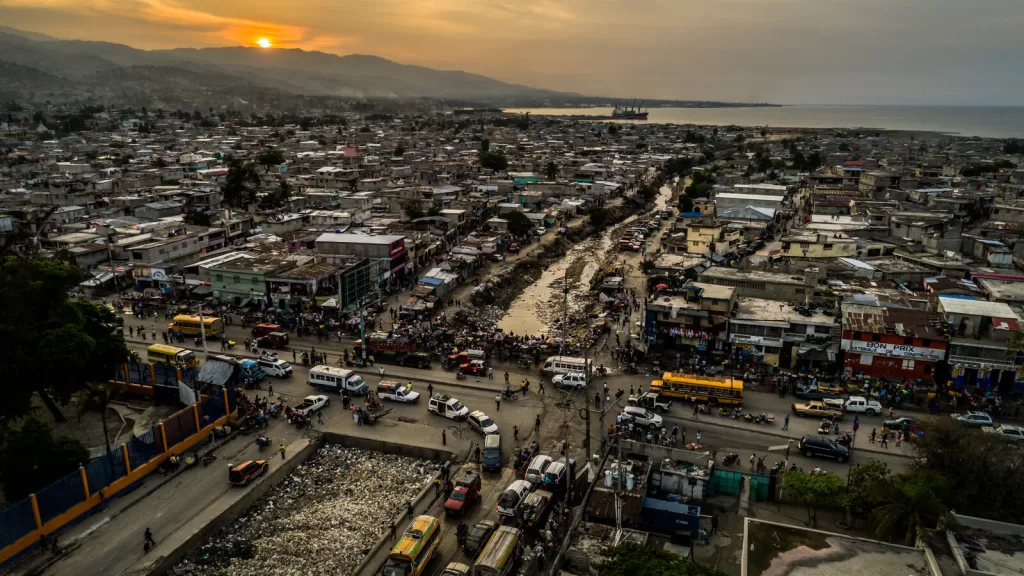Haiti Country Report

Haiti, located on the island of Hispaniola in the Caribbean, is known for its vibrant culture, history, and resilience. The country’s capital is Port-au-Prince. Haiti is the poorest country in the Western Hemisphere, facing numerous socio-economic challenges, including poverty, unemployment, and inadequate infrastructure. The economy relies heavily on agriculture, with significant vulnerabilities to natural disasters such as hurricanes and earthquakes. Haiti has a tumultuous political history marked by instability, corruption, and weak governance. Despite ongoing efforts to promote stability and development, Haiti continues to face significant challenges in rebuilding and improving the lives of its citizens. International assistance and cooperation play a crucial role in supporting Haiti’s recovery efforts and promoting sustainable development.
Last updated: September 29, 2022
Security
Haiti faces significant security challenges, including high levels of crime, gang violence, and political unrest. Violent crime, including armed robberies, carjackings, and kidnappings, is widespread, particularly in urban areas such as Port-au-Prince. Gang-related violence and turf wars further contribute to insecurity, with gangs exerting significant influence in some neighborhoods. Additionally, political instability and social unrest periodically lead to protests, demonstrations, and civil disturbances, posing risks to public safety. The Haitian National Police, with support from international partners, works to maintain law and order, but capacity and resources remain limited. Travelers to Haiti are advised to exercise caution, remain vigilant, and avoid areas prone to violence and unrest.
Last updated: September 29, 2022
Infrastructure

Haiti’s infrastructure faces numerous challenges, reflecting its status as one of the least developed countries in the Western Hemisphere. The country’s road network is often in poor condition, with limited connectivity and maintenance, particularly in rural areas. Access to electricity and clean water is inconsistent, with many communities lacking reliable services. Haiti’s healthcare and education systems also suffer from underinvestment and inadequate facilities. Additionally, the country’s ports and airports have limited capacity and efficiency, hindering trade and transportation. Natural disasters, such as hurricanes and earthquakes, further damage infrastructure and impede recovery efforts. Despite ongoing efforts to improve infrastructure, significant investments and international assistance are needed to address Haiti’s infrastructure deficiencies and support sustainable development.
Last updated: April 25, 2022
Environment

Haiti’s environment faces significant challenges, including deforestation, soil erosion, and natural disasters. Deforestation, driven by unsustainable logging practices and land clearing for agriculture, has led to loss of biodiversity and increased vulnerability to soil erosion and landslides. Soil erosion, exacerbated by deforestation and poor land management, threatens agricultural productivity and exacerbates poverty and food insecurity. Haiti is also susceptible to natural disasters, such as hurricanes, floods, and earthquakes, which can cause widespread destruction and loss of life. Additionally, inadequate waste management contributes to pollution and environmental degradation. Efforts to address these challenges include reforestation programs, sustainable land management initiatives, disaster preparedness measures, and international cooperation and assistance. Despite these efforts, Haiti’s environment remains fragile, and ongoing action is needed to promote conservation and resilience.
Last updated: March 14, 2022
Health and Medical
Haiti’s healthcare system faces numerous challenges, including limited access to medical services, inadequate infrastructure, and shortages of medical personnel and supplies. The country struggles with high rates of infectious diseases such as malaria, cholera, and tuberculosis, as well as maternal and child health issues. Access to clean water and sanitation facilities is also limited, contributing to the spread of waterborne diseases. Efforts to improve healthcare delivery and infrastructure are ongoing, but significant investments and international support are needed to address the systemic challenges facing Haiti’s healthcare sector.
Last updated: March 30, 2022
Political
Haiti’s political landscape is marked by instability, corruption, and social unrest. The country has a history of political upheaval, with frequent changes in government and challenges to democratic governance. Corruption is pervasive at various levels of government, hindering development and exacerbating socio-economic inequalities. Political instability and social unrest often lead to protests, demonstrations, and occasional violence. The Haitian government, with support from international partners, works to address these challenges and promote stability and development. However, political tensions and governance issues persist, posing obstacles to Haiti’s progress and prosperity.
Last update: September 28, 2022















